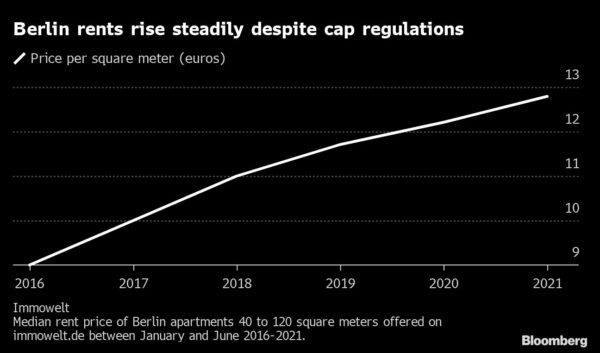By Alice Kantor
Skyrocketing demand is hitting up against strict rent regulations in Berlin, sparking some unusual deal-making.
Renters say they are being asked to spend small fortunes on furniture and appliances to sign a lease. In other cases, it’s several months’ rent in cash to agents as a fee. Some tenants are even agreeing to pay more than what’s legally allowed, either because they don’t know the law — or they just want the apartment, according to real estate agents.

In Germany, it’s common for apartments to come with just the bare bones — oftentimes without appliances or even kitchen cabinets. So it’s not unusual for tenants to sell their belongings to the next occupant. But whereas in the past, that might have meant expecting to pay about 1,000 to 3,000 euros for some of the hand-me-downs, renters and agents say that lately they’re seeing exorbitant markups.
One ad recently asked 25,000 euros ($28,300) up front for kitchen equipment, a TV and furniture — including a couch, bed, garden furniture and other items. The rent for the one-bedroom apartment was 930 euros a month. The ad, which appeared for a short period of time on the website ImmoScout24, said the amount was non-negotiable.
Alix Weidner felt fortunate when she snagged a place for 1,630 euros a month. To get the apartment, she agreed to buy the previous tenants’ belongings for 8,000 euros — including a TV, washing machine and some furniture. She had the money, so she moved quickly before the offer disappeared.
“Most people in Berlin can’t afford that,” said Weidner, 30, a project manager at the French Institute.
Rent Limits
It’s illegal to sell furniture for more than 50% over its value, but challenging the price often would be seen as too risky: You could lose in court, or the cost of suing wouldn’t be worth it. Instead, some renters are happy just to get the chance to sign a lease with relatively stable rent. Landlords who don’t want to go through the trouble of finding a new tenant will usually agree to let the old tenant run the ad and pick a candidate.
In Berlin, landlords can’t raise rent more than 10% above the area average and more than 15% over a three-year period. They can also increase rent once a year, but some landlords charge more and try to get away with it, tenants’ advocates say.
“People are offering to pay thousands of euros for furniture that is worth much less, agreeing on things that are not reasonable — such as high prices when the landlord is not supposed to ask for that much — or counter offering with higher rent,” said Ioannis Tzakris, CEO of real estate agency Black Label Properties. “It’s pretty wild.”
One loophole exploited by some landlords: They will add a few items of furniture in an otherwise-unfurnished apartment to legally allow them to levy a surcharge, often going over the 2% additional charge they’re permitted, Matthias Wurm, a lawyer at Schlun & Elseven, said in an email.
Other cases include renewing fixed-term leases, something not allowed in Germany unless there is a very specific reason for doing so, but which allows landlords to increase the rent from lease to lease. Another pitfall is claiming higher rent due to extensive modernization made to the apartment, an exception in the law which permits owners to charge more. Landlords tend to use this exception even when the modernization efforts fall below the legal standards to qualify for it.

Tight Market
“The market is so tight right now that some people try to profit from these difficult situations,” said Anna Kuznetsova, general manager of First Citiz Berlin, a real estate agency, although she added that people taking advantage are in the minority. “Out of hundreds of ads, you’ll see one or two crazy ones.”
Rent in Berlin has gone up 42% in five years, according to data from online rental brokerage Immowelt, and 5% this past year alone. That’s faster than in Munich, where average rent has gone up 24% in the past five years and 2% in the past year. In Frankfurt, prices increased 16% between 2016 and 2021 and stayed flat this past year.
A 60-square-meter (646-square-foot) apartment in Berlin would cost an average rent of 606 euros a month, based on an average cost of 10.1 euros per square meter, according to a Deloitte July 2021 report. That’s fairly affordable compared with other major European cities. In Barcelona, a similar-sized apartment would run you 1,002 euros, and in Paris it would be 1,716 euros a month, according to figures in the report.
In 2020, the soaring market prompted Berlin to try to clamp down by instituting a rent freeze, but earlier this year a German federal court overturned the measure. The city has also been under pressure to create more public-housing units. Voters approved a referendum urging the city to figure out a way to force large, private companies to sell their apartment holdings to the government. Others say what the city really needs is to build more housing, though that will take years.
“Berlin’s real estate market is nuts right now, and it’s opened the door to various scams and forms of abuse,” said Thomas Schulte, a Berlin-based lawyer specializing in consumer fraud. He’s seen a proliferation of ads for apartments that aren’t actually available, with scammers asking for cash to secure an apartment to which they have no access.
Most at risk are expats or recent immigrants who might not know the laws, Schulte said. “Foreigners don’t know about the regulations and safety checks,” he said.
More stories like this are available on bloomberg.com.




